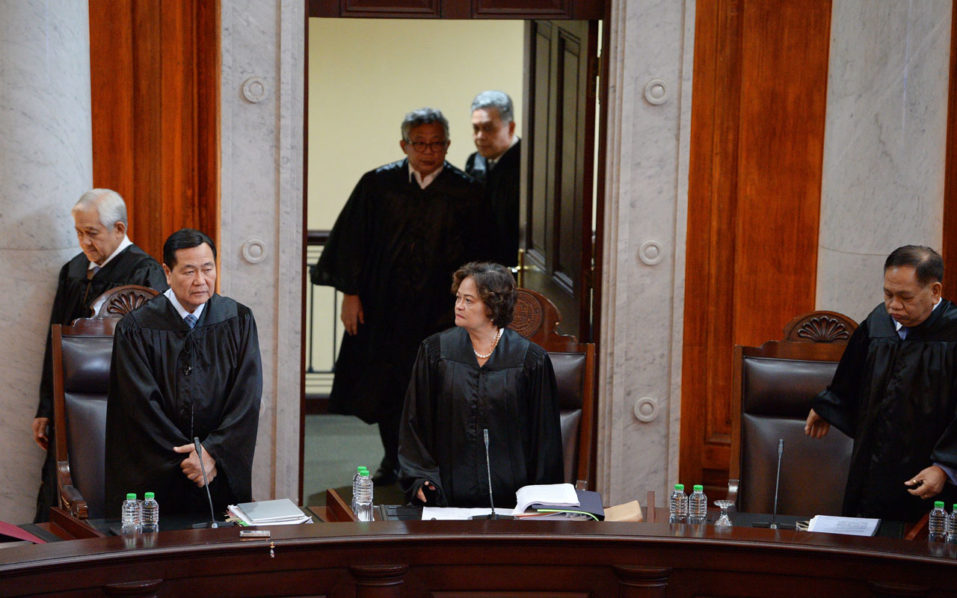 |
| Members of the Supreme Court of the Philippines, led by its newly-appointed Chief Justice Teresita de Castro (C), arrive to hear oral arguments on the petition to quit the International Criminal Court, at the Supreme Court in Manila on August 28, 2018. The Philippines’ top court heard arguments on August 28 against President Rodrigo Duterte’s move to quit the International Criminal Court which is examining his deadly drug war, with advocates calling it unconstitutional. / AFP PHOTO / TED ALJIBE |
Rights advocates urged the Philippines’ top court on Tuesday to halt President Rodrigo Duterte’s push to quit the International Criminal Court, which has launched a preliminary probe into his deadly narcotics crackdown.
In oral arguments before the Supreme Court in Manila, they told the justices the Philippine Senate would have to approve the nation’s withdrawal from the tribunal’s founding treaty.
Duterte in March gave notice he was pulling out of the agreement, saying the ICC’s examination of his internationally condemned drug war was “unduly and maliciously created”.
However opposition senators and rights advocates have asked the Supreme Court to declare the withdrawal invalid, arguing the constitution requires two-thirds of the Senate to approve the move.
“A treaty already transformed into Philippine law cannot be undone by a one-sided act of the president. Only the Senate can undo its own act,” Romel Bagares, lawyer for a coalition of campaigners, told the court.
Judges will next hear from senators who are also plaintiffs in the case as well as the government’s lawyers, but the court does not set itself deadlines to issue rulings and cases sometimes take years to resolve.
Opened in 2002, the ICC is the world’s only permanent war crimes court and aims to prosecute the worst abuses when national courts are unable or unwilling.
The Philippines, under previous president Benigno Aquino, ratified the Rome Statute in 2011, giving the tribunal authority to investigate crimes on its soil.
But Duterte has pushed back against the ICC as he defends his narcotics crackdown which police say has killed more than 4,000 alleged drug dealers or users.
Rights groups say the actual number of dead is triple that and could amount to crimes against humanity.
Officially quitting the court requires a year’s notice and experts say pulling out does not preclude an investigation of the killings.
Duterte’s government says the Senate’s constitutional powers apply only to ratifying new treaties, not withdrawing from them.
The ICC’s examination came after complaints from a lawyer and lawmakers critical of the drug war.
On Tuesday, families of people killed in the crackdown filed a similar complaint before the Hague-based tribunal, alleging Duterte “ordered and incited the killings”.
Duterte’s spokesman Harry Roque downplayed the importance of the new filing.
“That’s not a complaint, that’s a communication because it’s still to be acted upon by the ICC,” he said.
In oral arguments before the Supreme Court in Manila, they told the justices the Philippine Senate would have to approve the nation’s withdrawal from the tribunal’s founding treaty.
Duterte in March gave notice he was pulling out of the agreement, saying the ICC’s examination of his internationally condemned drug war was “unduly and maliciously created”.
However opposition senators and rights advocates have asked the Supreme Court to declare the withdrawal invalid, arguing the constitution requires two-thirds of the Senate to approve the move.
“A treaty already transformed into Philippine law cannot be undone by a one-sided act of the president. Only the Senate can undo its own act,” Romel Bagares, lawyer for a coalition of campaigners, told the court.
Judges will next hear from senators who are also plaintiffs in the case as well as the government’s lawyers, but the court does not set itself deadlines to issue rulings and cases sometimes take years to resolve.
Opened in 2002, the ICC is the world’s only permanent war crimes court and aims to prosecute the worst abuses when national courts are unable or unwilling.
The Philippines, under previous president Benigno Aquino, ratified the Rome Statute in 2011, giving the tribunal authority to investigate crimes on its soil.
But Duterte has pushed back against the ICC as he defends his narcotics crackdown which police say has killed more than 4,000 alleged drug dealers or users.
Rights groups say the actual number of dead is triple that and could amount to crimes against humanity.
Officially quitting the court requires a year’s notice and experts say pulling out does not preclude an investigation of the killings.
Duterte’s government says the Senate’s constitutional powers apply only to ratifying new treaties, not withdrawing from them.
The ICC’s examination came after complaints from a lawyer and lawmakers critical of the drug war.
On Tuesday, families of people killed in the crackdown filed a similar complaint before the Hague-based tribunal, alleging Duterte “ordered and incited the killings”.
Duterte’s spokesman Harry Roque downplayed the importance of the new filing.
“That’s not a complaint, that’s a communication because it’s still to be acted upon by the ICC,” he said.
AFP
In this article:
